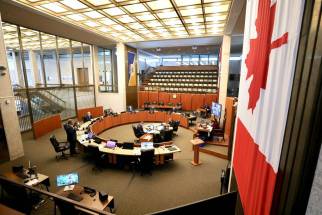Canadians keep calm, not rage on
Read this article for free:
or
Already have an account? Log in here »
To continue reading, please subscribe:
Monthly Digital Subscription
$0 for the first 4 weeks*
- Enjoy unlimited reading on winnipegfreepress.com
- Read the E-Edition, our digital replica newspaper
- Access News Break, our award-winning app
- Play interactive puzzles
*No charge for 4 weeks then price increases to the regular rate of $19.00 plus GST every four weeks. Offer available to new and qualified returning subscribers only. Cancel any time.
Monthly Digital Subscription
$4.75/week*
- Enjoy unlimited reading on winnipegfreepress.com
- Read the E-Edition, our digital replica newspaper
- Access News Break, our award-winning app
- Play interactive puzzles
*Billed as $19 plus GST every four weeks. Cancel any time.
To continue reading, please subscribe:
Add Free Press access to your Brandon Sun subscription for only an additional
$1 for the first 4 weeks*
*Your next subscription payment will increase by $1.00 and you will be charged $16.99 plus GST for four weeks. After four weeks, your payment will increase to $23.99 plus GST every four weeks.
Read unlimited articles for free today:
or
Already have an account? Log in here »
Hey there, time traveller!
This article was published 30/08/2022 (1194 days ago), so information in it may no longer be current.
Most Canadians aren’t that angry. Some are grumpy or annoyed, depending on what you ask them.
However, the vast majority are not boiling over with anger — the kind that may cause someone to confront a federal cabinet minister and shout obscenities at them in a fit of rage.
At least that’s the finding of Toronto-based marketing firm Pollara Strategic Insights, which launched its “rage index” this week, a new monthly public opinion poll designed to track the mood of Canadians.
Only 14 per cent of Canadians are “very angry” when asked how they feel about six topics: the federal and provincial governments, the economy, personal finances, “changes happening in Canada” (whatever that means), and “the latest stories in the news,” according to the survey.
The rest are either “annoyed or moderately angry” (35 per cent), neutral (35 per cent), or pleased, moderately happy or very happy (16 per cent).
“Despite this grumpiness, feelings of intense rage are still limited to a vocal minority,” the polling firm said in its report.
There’s little doubt, in the wake of the COVID-19 pandemic, we are seeing more abusive behaviour directed towards people in the public eye, including politicians, public health officials and journalists.
The deranged man who lashed out at federal Finance Minister Chrystia Freeland last week as she was entering an elevator at city hall in Grande Prairie, Alta., was an extreme example.
COLE BURSTON / THE CANADIAN PRESS FILES Federal Finance Minister Chrystia Freeland.
The disturbing, misogynistic verbal attack was not an isolated incident, as Prime Minister Justin Trudeau and others have pointed out. But it’s not common, either. Far from it.
There may a temptation to conclude a general sense of anger is overtaking Canadians — that the polite discourse we like to believe defines the nation is disappearing. That would be a misread.
The vast majority of Canadians are not seething with anger and do not publicly lash out at politicians or anybody else. Most are reasonable, responsible people who show compassion towards others and understand they live in a community where collective action — such as public health measures during a pandemic — are required from time to time for the greater good of society.
COVID-19 hasn’t changed that. In fact, it probably strengthened it. The vast majority of Canadians followed public health orders, got vaccinated and came together to support their communities. For the most part, it was a remarkable show of strength and solidarity in a time of crisis.
There were disagreements on the finer points of how governments responded to the pandemic, but that’s to be expected. Only a small minority refused to get vaccinated, ignored public health measures or threw hissy fits when asked to wear a mask. An even smaller proportion joined so-called “freedom convoys.”
Only 16 per cent of Canadians said they were very angry when asked how they felt about the federal and provincial governments, according to Pollara’s rage index. When asked about the Canadian economy, 17 per cent said they felt very angry. Only six per cent were very angry about their personal finances.
Canadians were far more upset about trucker convoys, the price of gasoline, and inflation generally than they were about government, according to the poll, which was conducted between July 25 and Aug. 2.
Canadians were far more upset about trucker convoys, the price of gasoline, and inflation generally than they were about government, according to the poll.
The fact a polling firm launched a rage index may suggest extreme anger is on the rise in Canada and it’s time to gauge it. Or, perhaps, it’s just a clever way to brand a poll. Fortunately, there isn’t much rage out there to measure.
The rise in verbal and online abuse against politicians, journalists and others is real. The rage is ill-defined and unfocused but no less concerning.
Some of it has spilled over from the United States as a direct consequence of the tactics used by former president Donald Trump to foster hate and intolerance. Some of it already existed in Canada and has been amplified by online misinformation and disinformation, the proliferation of conspiracy theories and a smattering of politicians who are trying to exploit both.
Thankfully, only a small minority of Canadians has fallen down that rabbit hole. For the most part, civility in Canada remains in good hands.
There is no sign that’s about to change any time soon.
tom.brodbeck@freepress.mb.ca

JOHN WOODS / THE CANADIAN PRESS FILES
The vast majority of Canadians are not seething with anger and do not publicly lash out at politicians or anybody else.

Tom has been covering Manitoba politics since the early 1990s and joined the Winnipeg Free Press news team in 2019.
Our newsroom depends on a growing audience of readers to power our journalism. If you are not a paid reader, please consider becoming a subscriber.
Our newsroom depends on its audience of readers to power our journalism. Thank you for your support.








